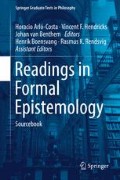Abstract
Suppose Q is a necessary consequence of P. Given only this much, it is, of course, quite trivial that if it is true that P, then it must also be true that Q. If it is a fact that P, then it must also be a fact that Q. If it is necessary that P, then it is necessary that Q; and if it is possible that P, then it must also be possible that Q.
Versions of this paper were read to the philosophy departments of several universities in the United States and Canada during the year 1969/1970. I profited greatly from these discussions. I wish especially to thank Paul Dietl who helped me to see a number of points more clearly (perhaps still not clearly enough in his opinion). Finally, my exchanges with Mr. Don Affeldt were extremely useful; I am much indebted to him in connection with some of the points made in the latter portions of the paper.
Access this chapter
Tax calculation will be finalised at checkout
Purchases are for personal use only
Notes
- 1.
Seeing and Knowing (Chicago: University Press, 1969), pp. 93–112, and also “Reasons and Consequences,” Analysis (April 1968).
- 2.
Unlike our other operators, this one does not have a propositional operand. Despite the rather obvious differences between this case and the others, I still think it useful to call attention to its analogous features.
- 3.
One must be careful not to confuse sentential conjunction with similar sounding expressions involving a relationship between two things. For example, to say Bill and Susan got married (if it is intended to mean that they married each other), although it entails that Susan got married, does not do so by simplification. ‘Reason why’ penetrates through logical simplification, not through the type of entailment represented by these two propositions. That is, the reason they got married is that they loved each other; that they loved each other is not the reason Susan got married.
- 4.
I think that those who are inclined to give a causal account of knowledge should be particularly interested in the operator ‘R ⇒…’ since, presumably, it will be involved in many instances of knowledge (“many” not “all,” since one might wish to except some form of immediate knowledge-knowledge of one’s own psychological state-from the causal account). If this operator is only semipenetrating, then any account of knowledge that relies on the relationship expressed by this operator (as I believe causal accounts must) will be very close to giving a “semi-penetrating” account of ‘knowing that’.
- 5.
The explanation for why the modal relationship between R and P (R ⇒ P) fails to carry over (penetrate) to the logical consequences of P (i.e., R ⇒ Q where Q is a logical consequence of P) is to be found in the set of circumstances that are taken as given, or held fixed, in subjunctive conditionals. There are certain logical consequences of P which, by bringing in a reference to circumstances tacitly held fixed in the original subjunctive (R ⇒ P), introduce a possible variation in these circumstances and, hence, lead to a different framework of fixed conditions under which to assess the truth of R @ Q. For instance, in the last example in the text, when it is said that A and B would not have collided if B had not swerved at the last moment, the truth of this conditional clearly takes it as given that A and B possessed the prior trajectories they in fact had on the occasion in question. Given certain facts, including the fact that they were traveling in the direction they were, they would not have collided if B had not swerved. Some of the logical consequences of the statement that B swerved do not, however, leave these conditions unaltered–e.g., B did not move in a perfectly straight line in a direction 2′ counterclockwise to the direction it actually moved. This consequence “tinkers” with the circumstances originally taken as given (held fixed), and a failure of penetration will usually arise when this occurs. It need not be true that A and B would not have collided if B had moved in a perfectly straight line in a direction 2′ counterclockwise to the direction it actually moved.
- 6.
I am aware that this characterization of “a relevant alternative” is not, as it stands, very illuminating. I am not sure I can make it more precise. What I am after can be expressed this way: if Brenda had ordered dessert, she would not have thrown it at the waiter, stuffed it in her shoes, or taken it home to a sick friend (she has no sick friend). These are not alternatives that might have been realized in the existing circumstances if the actual state of affairs had not materialized. Hence, they are not relevant alternatives. In other words, the ‘might have been’ in my characterization of a relevant alternative will have to be unpacked in terms of counterfactuals.
- 7.
The same example works nicely with the operator ‘R ⇒…’. It may be true to say that Otto would not be dead unless Lefty killed him (unless what Lefty did to him was kill him) without its being true that Otto would not be dead unless Lefty killed him (unless it was Lefty who killed him).
Author information
Authors and Affiliations
Editor information
Editors and Affiliations
Rights and permissions
Copyright information
© 2016 Springer International Publishing Switzerland
About this chapter
Cite this chapter
Dretske, F.I. (2016). Epistemic Operators. In: Arló-Costa, H., Hendricks, V., van Benthem, J. (eds) Readings in Formal Epistemology. Springer Graduate Texts in Philosophy, vol 1. Springer, Cham. https://doi.org/10.1007/978-3-319-20451-2_27
Download citation
DOI: https://doi.org/10.1007/978-3-319-20451-2_27
Publisher Name: Springer, Cham
Print ISBN: 978-3-319-20450-5
Online ISBN: 978-3-319-20451-2
eBook Packages: Religion and PhilosophyPhilosophy and Religion (R0)

